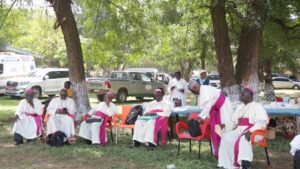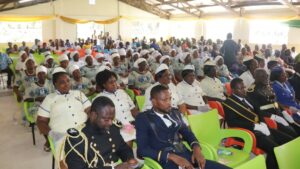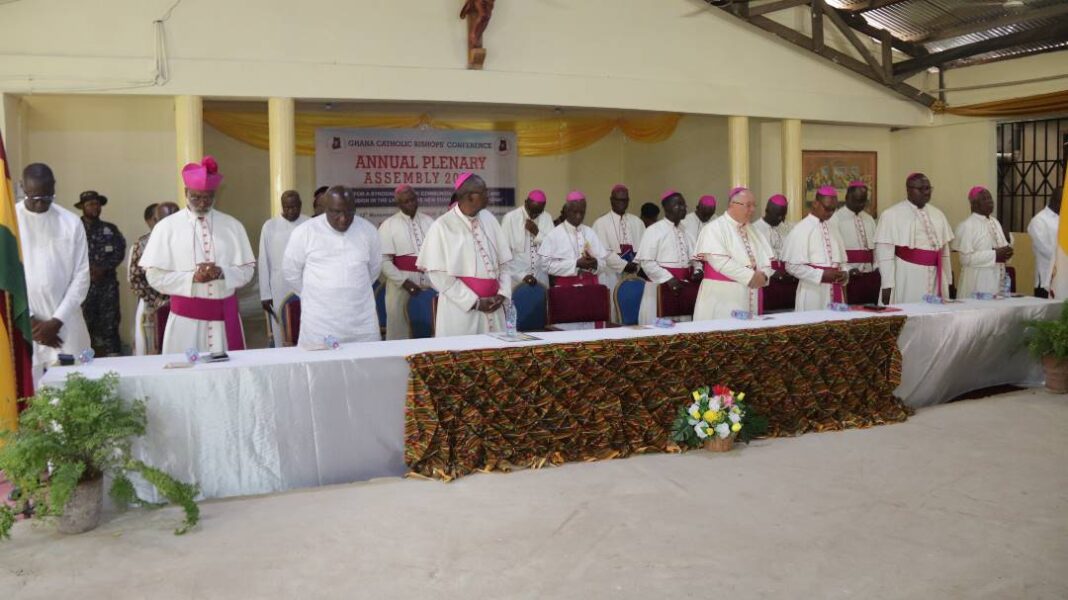In a keynote address to open the 2022 Plenary Assembly of the Ghana Catholic Bishops’ Conference (GCBC) currently ongoing at Donkorkrom, the Most Rev. Philip Naameh says at the level of the Conference, the Bishops have collected and created an accurate synthesis of what was truly captured in the responses from our Dioceses on the Synodal journey.
“These responses represent the voices of our faithful especially of the poor, the voiceless and the marginalised,” he stated, and urged all not to put the reports on the shelves but to work with them.
He noted that “Our lay faithful have called for more collaboration with the clergy and the bishop, and for more responsibilities. They have also raised concerns about how little their views are sought on issues.”
According to Archbishop Naameh, the report revealed further their preparedness to put their God-given gifts and talents at the service of communion and for the mission of the Church, adding, “Our task is to further deepen this spirit of the synod to discern together the way God wants us to go as Church with all the members playing their parts under the guidance of the Spirit.”
Again, he noted that the process had revealed that when all the baptised are invited to dig deeply into the baptismal identity and to listen to the Spirit calling us all to a future filled with hope, the mission to evangelise will be boosted.
“We need to let ourselves be educated by the Spirit to a truly synodal mentality, entering with courage and freedom of heart into a conversion process that is indispensable for the continual reformation of which the Church always has need, in so far as she is a human institution.”
He invited the people of God to take the act of listening further by broadening consultation. On this journey together, listening to hopes and dreams people have for the Church has the power to make us live out our mission.
Archbishop Naameh, who is the Archbishop of Tamale, also reminded the people of God that the goal of the Synodal journey was nothing less than to provide the entire Church with an opportunity to rethink her identity in the light of her mission.
Synodality is “intended to inspire people to dream about the Church we are called to be, to make people’s hopes flourish, to stimulate trust, to bind up wounds, to weave new and deeper relationships, to learn from one another, to build bridges, to enlighten minds, warm hearts, and restore strength to our hands for our common mission.”

In ensuring participation in civil governance, Archbishop Naameh said “involving people from the various regions or cultures and listening to them will ensure that the policies we make will address their concerns.”
“Our diversity is a gift from God. He has endowed every tribe and region with resources and with competent people. Therefore, every group has something to offer the country and something to learn from others,” he said.
He noted that by listening to the cries and concerns of the people especially those at the bottom of the ladder, successive governments could formulate appropriate policies that would ensure the development of our people.
He called on the government to as a matter of necessity engage the Civil Society Organizations (CSOs) to improve the economic and social situation of the country, stressing that “The CSOs, because of the nature of their work, have knowledgeable and competent persons on every sector of the economy who will be more than willing to offer their expertise in the service of the nation.”
Some of these CSOs, he stated could be part of negotiations or the signing of (economic) agreements between the government and other agencies. For instance, the government could involve some of them in the IMF negotiations or programme.
Also, the GCBC President suggested other political parties should be consulted on national policies.

“The voices of religious organisations including the Catholic Church need to be heard. All of us have the interest of the state at heart and are ready to offer good advice on every issue of national and economic interest,” he pointed out.
He again called on the government to reconsider and engage others on decisions that had divided the opinion of the people, saying, “When a large section of the people is against a particular policy, it is possible that its implementation may suffer if it is rushed or pushed through.”
“More consultation should be done in order to address the concerns especially of those who may not be in support of the policy for genuine reasons,” concluded.



